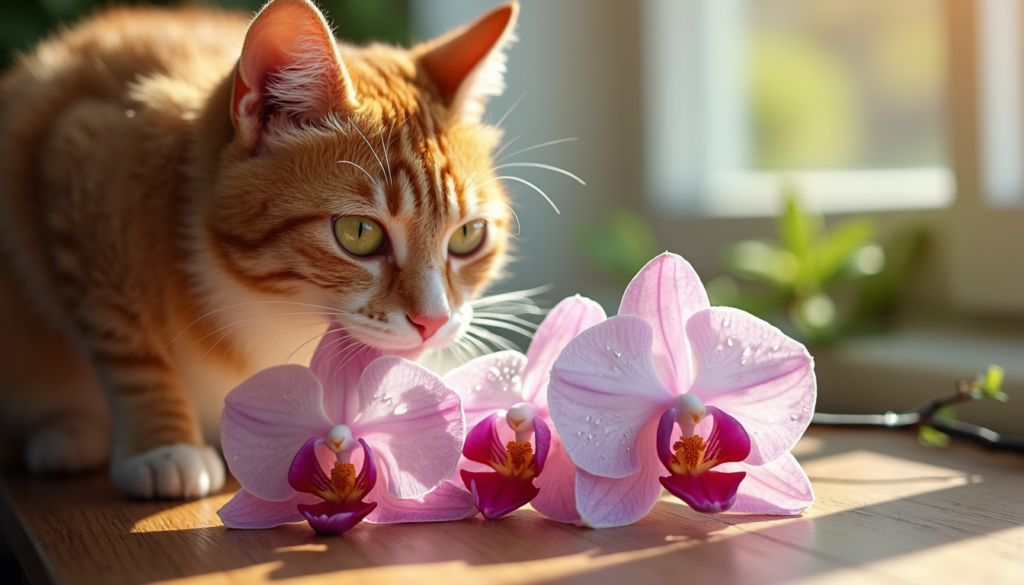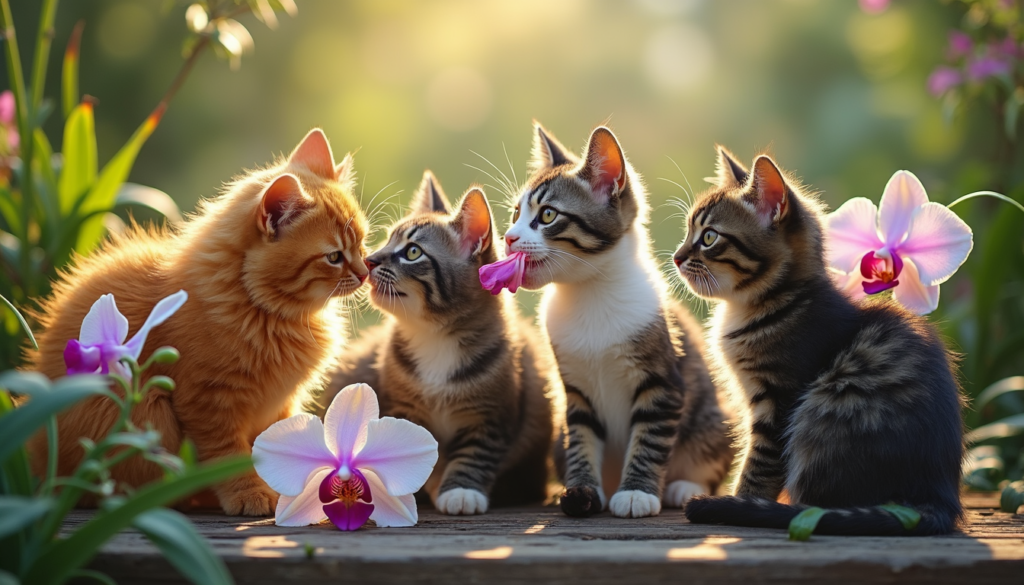Key Takeaways: Most orchids, including Phalaenopsis (moth orchids), Cattleya, and Dendrobium, are safe for cats. However, some species like the Lady Slipper Orchid can cause mild gastrointestinal upset. To keep your cat safe, place orchids out of reach and provide safe alternatives like cat grass. Monitor your cat for any signs of discomfort and consult a veterinarian if symptoms persist.
Orchids are stunning additions to any home, but if you’re a cat owner, you might be wondering, “Are orchids toxic to cats?” The good news is that most orchid species are considered non-toxic to felines. According to the American Society for the Prevention of Cruelty to Animals (ASPCA), there are no known species of orchid that are poisonous to cats. This means that popular varieties like Phalaenopsis (moth orchids), Dendrobium, and Cattleya are generally safe for your furry friend.

Understanding Orchid Toxicity
When it comes to the question are orchids toxic to cats, the answer is generally reassuring. Most orchid species are considered non-toxic to felines. Here’s an overview of popular orchid types:
- Phalaenopsis (Moth Orchid): These are safe and commonly found indoors.
- Dendrobium: Also non-toxic, this variety enhances home decor.
- Cattleya: Known for vibrant blooms, they pose no threat to your cat.
However, while orchids are mostly harmless, it’s essential to note that some cats may experience mild gastrointestinal upset if they munch on plant material. To prevent any discomfort, follow these tips:
- Monitor your cat’s behavior around houseplants.
- Keep orchids out of reach to discourage chewing.
- Observe for any symptoms of irritation or digestive distress.
In summary, the majority of orchids are not toxic to cats, making them an excellent choice for pet owners. However, being vigilant ensures a safe environment for your furry friend. Always remember that are orchids toxic to cats is a crucial consideration, but with the right care, cats and orchids can coexist harmoniously.
Common Plants That Are Toxic to Cats
Understanding which plants are harmful to our feline friends is essential for every pet owner. While you’re considering the question, are orchids toxic to cats, it is equally important to be aware of other common toxic plants. Here’s a concise list of some plants that pose a risk:
- Lilies: Highly toxic, even small amounts can cause severe kidney damage.
- Azaleas: Ingestion can lead to vomiting, diarrhea, and potentially fatal heart issues.
- Sago Palm: All parts are toxic; the seeds particularly can be lethal.
- Philodendron: Can cause oral irritation and swelling, leading to difficulty swallowing.
| Plant | Toxicity Level | Symptoms |
|---|---|---|
| Lilies | High | Vomiting, kidney failure |
| Azaleas | High | Vomiting, heart problems |
| Sago Palm | Very High | Liver failure, seizures |
| Philodendron | Moderate | Oral irritation, swelling |
As you assess your indoor plants, remember that while orchids are generally not toxic to cats, many other plants can pose serious health risks. Always ensure a pet-safe environment by removing or placing these plants out of reach. By identifying toxic plants, you safeguard your furry companions against poisoning.

Identifying Non-Toxic Plants for Pet Owners
Choosing pet-safe plants is essential for maintaining a healthy home environment. If you’re concerned about whether are orchids toxic to cats, you’ll be relieved to know that most orchids are non-toxic to these furry friends. To help you in selecting safe options, here’s a list of both non-toxic plants that are friendly for pets and some alternatives to avoid:
Non-Toxic Plant Options:
- Orchids (most species) – Generally safe for cats.
- Spider Plant – Easy to care for and non-toxic.
- Bamboo Palm – Adds a tropical touch without risk.
- Boston Fern – Safe and lush greenery.
- African Violet – Beautiful blooms that are also safe.
Plants to Avoid:
- Lilies – Extremely toxic and can cause kidney failure.
- Sago Palm – All parts are harmful, particularly the seeds.
- Azalea – Can lead to vomiting and cardiovascular collapse.
By knowing which plants are safe, you can enjoy a vibrant home without worrying about your cat’s safety. If you ever wonder are orchids toxic to cats, remember that maintaining a pet-friendly space is always a priority.
Symptoms of Poisoning in Cats
Understanding the symptoms of poisoning is crucial for cat owners, especially regarding plants like orchids. So, are orchids toxic to cats? While orchids are generally considered non-toxic, it’s still vital to recognize potential signs of distress in your feline companions.
Common symptoms of poisoning in cats include:
- Vomiting: Frequent or severe vomiting can indicate sickness.
- Diarrhea: Loose stools or changes in bowel movements may occur.
- Lethargy: Excessive tiredness or lack of energy should raise concerns.
- Loss of Appetite: If your cat suddenly refuses to eat, it might indicate discomfort.
- Excessive Drooling: Noticeable drool can signal gastrointestinal irritation.
- Tremors or Seizures: Neurological symptoms may arise, although they are rare.
If you notice any of these symptoms after your cat has interacted with an orchid, it’s important to monitor them closely. If symptoms persist or worsen, seek veterinary attention immediately.
Preventive Measures for Pet Safety
To prevent your cat from nibbling on your orchids, consider the following tips:
- Keep Orchids Out of Paws’ Reach: Place orchids in areas inaccessible to your cat.
- Redirecting Feline Curiosity: If your cat shows interest in an orchid, distract them with a toy or treat to reinforce good behavior.
- Avoid Toxic Fertilizers: Choose cat-safe fertilizers or natural alternatives when caring for your orchids.
By taking these precautions, you can create a safer environment for both your cat and your beautiful orchids.

Other Toxic Plants to Be Aware Of
While orchids are generally safe, there are other common houseplants that can be toxic to cats. Here’s a list of some plants to avoid:
- Tulips: Can cause vomiting and diarrhea.
- Aloe Vera: Can result in lethargy and tremors.
- Snake Plants: Can cause gastrointestinal distress.
Understanding the potential risks of these plants can help you make informed decisions about which plants to keep in your home. Always research the toxicity of any new plant before bringing it into your home.
Conclusion
In conclusion, most orchids are safe for cats, making them an excellent choice for pet owners. By choosing non-toxic varieties, placing plants out of reach, and monitoring your cat for any signs of discomfort, you can enjoy the beauty of orchids without putting your cat at risk. Remember, if you ever have concerns about plant toxicity or your cat’s health, it’s always best to consult with a veterinarian.
By following these tips, you can ensure a harmonious and safe environment for both your cat and your beautiful orchids. A little care and attention can go a long way in keeping your furry friend healthy and happy.

